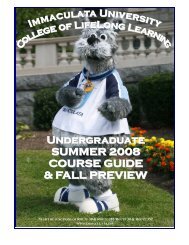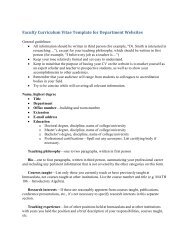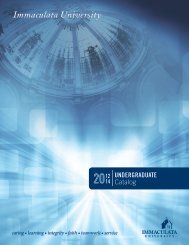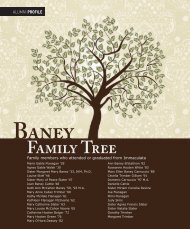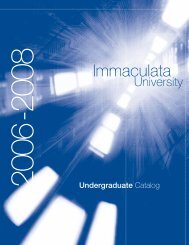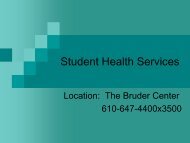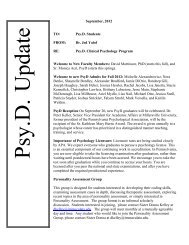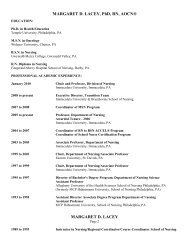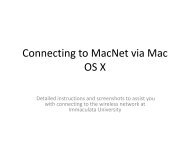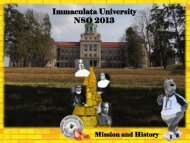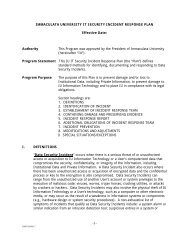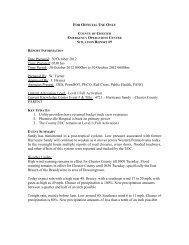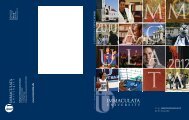Undergraduate Catalog 2008-2010 - Immaculata University
Undergraduate Catalog 2008-2010 - Immaculata University
Undergraduate Catalog 2008-2010 - Immaculata University
Create successful ePaper yourself
Turn your PDF publications into a flip-book with our unique Google optimized e-Paper software.
MATH 400 Topics in Math (1-3)<br />
A study of selected topics outside usual offerings; by prior<br />
arrangement with the department. The topics of the course will vary<br />
depending on the students’ interests, but some common topics we<br />
offer include:<br />
- Applied (3) - Builds upon prior knowledge to develop concepts<br />
in higher mathematics and use them to model real-world<br />
problems. (Prerequisites: MATH 208 or 302 or instructor’s<br />
approval)<br />
- Discrete (3) – Covers selected topics from combinatorics, graph<br />
theory, number theory, and/or game theory. (Prerequisites:<br />
MATH 216; Recommended: CIS 218)<br />
- Modeling (3) – Teaches students to develop mathematical<br />
models from real-world problems. Discusses the solution of the<br />
mathematical model, and evaluation of the effectiveness of the<br />
model. (Prerequisites: MATH 204 or 208 or 302 or instructor’s<br />
approval)<br />
- Problem Solving (3) – Provides students with an exposure to<br />
challenging mathematical problems and teaches them methods<br />
of solution. This course will develop critical thinking skills as<br />
well as teaching the students to use their own creativity.<br />
(Prerequisites: MATH 203 or 207or 301 or instructor’s approval)<br />
MATH 400 Topics in Math (1-3) (continued)<br />
- The Post Baccalaureate Teacher Certification Program requires<br />
the following topic courses(1):<br />
History of Mathematics<br />
Strategies of Teaching Mathematics<br />
Computers in the Classroom<br />
MATH 405 Professional Internship (1-3)<br />
A limited-enrollment, mentored professional field experience in<br />
the application of math skills. Students will apply for positions in<br />
industry that will provide hands-on field experience and enhance<br />
career readiness. (Prerequisite: Math305 or Dept Approval)<br />
MATH 408 Research Fundamentals (1-3)<br />
An introduction to researching a topic of interest in an advanced<br />
mathematics or computer related area chosen by the student in<br />
consultation with the instructor. (See CIS 408) (Prerequisite: Math<br />
305 or Dept Approval)<br />
MATH 409 Mathematics/Computer Directed Reading (3)<br />
Assigned readings on specific themes in mathematical or<br />
computer-related topics, to be chosen by group and instructor; short<br />
reports to group on aspects of themes. (See CIS 409) (Prerequisite:<br />
Math 305 or Dept Approval)<br />
MATH 410 Mathematics/Computer Senior Seminar (3)<br />
Use of professional research methods for the development of an<br />
in-depth research paper and presentation on a mathematical or<br />
computer related topic chosen by the student in consultation with the<br />
instructor. (See CIS 410) (Prerequisite: Math305 or Dept Approval)<br />
MATH 412 Selected Studies for Teachers (3)<br />
Topics in linear algebra, algebraic structures and statistics,<br />
number theory; mathematical modeling. Paper required. (Open only<br />
to students in the Post Baccalaureate Teacher Certification Program.)<br />
COMPUTER SCIENCE<br />
CIS 105 3D Computing (3)<br />
An introduction to computing concepts using a 3D visual<br />
environment. The visual environment simplifies the complexities<br />
associated with computing. Students will gain an understanding of<br />
beginning and intermediate computing constructs through the<br />
creation of 3D characters and environments. (Appropriate for all<br />
students; no prerequisites)<br />
CIS 201 Computer Literacy I (3)<br />
Students develop confidence and competence in the use of key<br />
pc applications such as: operating system functions, utilities, word<br />
processing, presentation, spreadsheet, database and web browsing.<br />
Students learn the history of computers and key computer concepts<br />
and the benefits and risks of computers in society. (Appropriate for<br />
all students; no prerequisites)<br />
CIS 202 Computer Literacy II (3)<br />
Students learn computer concepts at a more advanced level.<br />
Hands-on integrated and advanced assignments cover Windows,<br />
spreadsheets, graphics, database, an introduction to programming,<br />
and new or evolving applications. (Prerequisite: Computer Science<br />
201 or equivalent)<br />
CIS 203 Computers and Information (3)<br />
Explores how and why computers are bringing about the current<br />
shift in the meaning of and the access to information. Hands-on use<br />
of computers will be an essential ingredient in the development of<br />
the knowledge and skills necessary to use computers for common<br />
business applications, in an understanding of the fundamentals of<br />
technology, and in the ability to assess the advantages and<br />
limitations of computers. (Offered in accelerated format only)<br />
CIS 214 Multimedia: Concepts and Design (3)<br />
An introduction to the basic design techniques and technical<br />
skills needed to organize and produce multimedia works for a<br />
variety of users in today’s media-intense society. Projects will<br />
include digitizing and editing sound, image, and video content and<br />
integrating the content with animated text and graphics into video or<br />
multimedia productions. Students will explore the philosophical,<br />
cultural, and sociological aspects of multimedia. (Competency in<br />
CIS 201 content is recommended.)<br />
CIS 215 Social Computing (3)<br />
Students will develop new proficiencies for the digital age in the<br />
use of the latest tools and techniques for efficiently and effectively<br />
finding information, analyzing it, communicating it and storing it<br />
(in all its forms: video, image, sound and document files).<br />
Approaches such as blogs, wiki’s, social bookmarking, clustering<br />
search engines, email, messaging, web conferencing, social<br />
networking, chats, threaded discussions, voice and video over<br />
Internet Protocol, podcasts and file/computer organization and<br />
maintenance will be explored. Social and interpersonal issues and<br />
opportunities will be examined.<br />
CIS 218 Software Design & Programming (3)<br />
Intermediate concepts for designing and creating of software<br />
applications. Content includes algorithm design, decomposition of<br />
complex ideas into manageable and understandable components,<br />
evaluation of algorithm design and implementation via a<br />
programming language currently used in industry practice.<br />
(Prerequisite: CIS 105, an approved prior programming course, or<br />
instructor’s approval)<br />
CIS 224 Database (3)<br />
Fundamentals of database, including: development life cycle,<br />
entity relationship model, relational model, SQL, normal forms, and<br />
a survey of new developments. Hands-on projects give the student<br />
81



